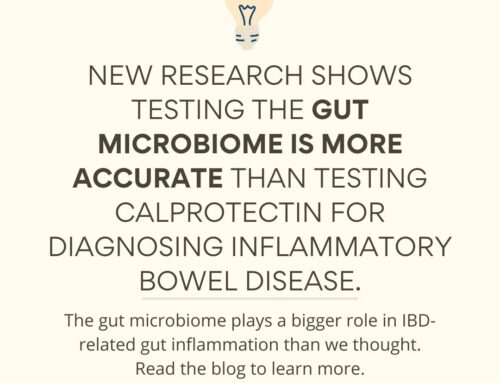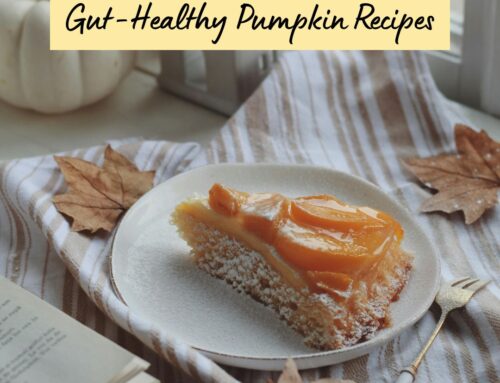Did you know that COVID-19 not only affects your lungs – but also your gut health? In this article, we’ll explore the surprising connection between COVID-19 and your gut microbiome. Most importantly, we’ll also look at what you can do to protect yourself from the damage it confers!
The Connection Between COVID-19 Survival and the Microbiome
Scientists began to learn about the connection between the gut microbiome and the respiratory system from patients with severe COVID infections.
Researchers at the University of Chicago Medicine found that the composition of gut microbiota and the metabolites they produce can predict the trajectory of respiratory function and death in severe COVID-19 patients.
Their study analyzed fecal samples from 71 patients with COVID-19 as they were admitted to the medical ICU at UChicago Medicine. They found that patients who suffered progressive lung failure and died had more Proteobacteria than patients who recovered. The researchers suggest that this finding presents an opportunity to prevent severe COVID-19 infection by using probiotic treatments that contain strains of bacteria that produce protective metabolites.
This finding demonstrated how integrally linked the gut microbiome and the immune and respiratory systems are.
COVID-19 and Gut Microbiome Changes
Another study looked at less severe infections and how it changed the gut microbiome. The researchers found that COVID-19 changed gut microbiome composition and gut barrier integrity.
As you may have guessed, COVID-19 worsened both. It weakened the gut lining, allowing bacteria to enter the bloodstream and cause additional infections. The study involved analyzing mouse feces and stool samples from nearly 100 COVID-19 patients, which showed that the virus reduced the diversity of bacteria in the gut microbiome and allowed opportunistic or antibiotic-resistant bacteria to overgrow.
The findings suggest that SARS-CoV-2 can damage the gut microbiome and increase the risk of secondary infections, particularly in patients with a high risk of blood infection.
So if you get COVID-19 – even if it’s a minor case – it’s a good idea to work on keeping your microbiome in check.
How to Keep Your Gut Microbiome Healthy During COVID-19
The studies above show that COVID-19 damages both your gut lining and the composition of your gut microbiome.
First and foremost, you’ll want to protect the strength of your gut barrier.
Recap: What is the Gut Barrier?
The gut barrier is a lot like how it sounds. It’s a wall between your body and your intestines. In simple terms, it keeps what is meant to stay inside the gut inside it.
However, the gut barrier has to let some things from inside the gut into the rest of the body. Nutrients like vitamins, proteins, electrolytes, and water are great examples.
It must keep some things out of the body too. Ideally, the barrier does not let pathogens and undigested food particles into the body – it should keep them in the gut so the body can get rid of them through stool.
The gut barrier lets only certain things through it. It’s like a bouncer – only those on the list can get in. This characteristic of the gut barrier is called selective permeability.
In cases of dysbiosis, excessive NSAID use, and inflammatory food and drink consumption, the gut barrier begins to weaken. The weaker it gets, the more porous it gets.
Increased permeability means that random things from inside the gut – those who aren’t on the list – may get by our bouncer, the gut barrier, and enter our bodies.
Overly-permeable gut barriers may permit food particles and pathogens to enter our bloodstream and cause damage throughout the body. This condition is called leaky gut syndrome.
Some people with leaky gut syndrome experience intense fatigue, digestive symptoms, autoimmune diseases, and other conditions. Others are asymptomatic.
Whether you’re experiencing leaky gut syndrome or not, strengthening your gut barrier is a great way to generally improve gut and immune health. Plus, preventing leaky gut down the line is an excellent investment.
So how do we strengthen our gut barriers? Let’s take a look.
Glutamine and the Gut Barrier
If there is one piece of information you should take away from this blog, it’s that glutamine is your friend!
Glutamine is an amino acid that is shown to:
- Significantly strengthen gut barrier integrity
- Diminish sugar cravings
- Support healthy metabolisms
Scientific evidence suggests that consuming over 5g of glutamine per day helps repair the gut lining.
Glutamine is found naturally in food. Meat like chicken and fish, vegetables like cabbage and spinach, and legumes like tofu, beans, and lentils are high in glutamine.
If you struggle with leaky gut syndrome, scientific evidence suggests that consuming over 5g of glutamine per day would help to repair your gut lining. If you simply want to prevent leaky gut syndrome, 2-5g is a reasonable dose.
If you’re looking to pack an extra punch, many BCAA drinks contain high glutamine levels. Glutamine can also be added to drinks and smoothies, and it typically comes in powder form. Glutamine tastes pretty neutral, so there isn’t much to worry about when mixing it in beverages.
Vitamins and the Gut Barrier
Three vitamins are essential for gut barrier integrity: omega 3, zinc, and vitamin D.
Omega 3 vitamins are valuable for decreasing inflammation in the gut and improving microbiome composition, which are potential root causes of leaky gut syndrome.
Omega 3 vitamins are found naturally in foods. Fish are the best source of omega 3 vitamins – they contain much higher amounts than vegetarian sources. Vegetarian sources include eggs, chia seeds, algae, walnuts, and flax seeds.
Most people are deficient in omega 3 vitamins. 1000 mg of omega 3 vitamins is the daily recommended dose. If you struggle to include enough omega 3 vitamins in your diet, supplementing with high-quality fish oil would greatly benefit your gut health.
Zinc is also incredibly valuable for immune and gut health. It is often recommended to those with colitis, Crohn’s disease, dysbiosis, SIBO, parasitic infections, or other gut issues because of its contribution to repairing the gut lining.
Zinc is found in beans, nuts, red meat, poultry, and certain dark leafy greens. Oysters are also incredibly high in zinc.
If you struggle to consume enough zinc in your diet, consider supplementing it. However, don’t go overboard – too much zinc can damage your gut lining. Aim for 8-11 mg per day.
Lastly, vitamin D is a crucial player. Some scientists believe a deficiency in vitamin D may even cause leaky gut syndrome – so making sure you’ve got enough vitamin D is key to overcoming the syndrome.
Vitamin D gets a 5-star rating with gut health. Evidence asserts that it decreases inflammation, upregulates beneficial bacteria, improves food breakdown and absorption, and repairs gut lining.
Vitamin D can be found in fish, dairy, certain mushrooms, eggs, and fortified foods. If you’re vegetarian or vegan, consider supplementing with vitamin D since it’s hard to attain from plant sources.
Next, let’s look at keeping our gut microbiome composition intact.
Overcoming Dysbiosis
To overcome dysbiosis, you’ll want to:
- Eliminate the harmful pathogens living in your gut microbiome
- Keep the helpful microbes already living in your gut microbiome
- Increase populations of helpful microbes living in your gut microbiome
You might already be familiar with strategies for keeping and increasing populations of helpful microbes in your gut microbiome, like:
- Consuming probiotics
- Eating fiber
- Eating fermented food
- Exercising
- Avoiding hefty doses of antibiotics
We’ve heard that all before. But what about the first piece of the equation? How do we eliminate harmful pathogens living in our gut microbiomes?
Getting Rid of the Bad Guys: Antibiotics?
Traditional treatment for dysbiosis typically involves antibiotics to clear the “bad” bacteria. The goal is to get rid of the bad bacteria that cause symptoms.
Antibiotics are the first-line treatment for dysbiosis, but they are often ineffective. In fact, studies have shown that antibiotics only work in about 50% of dysbiosis cases.
This may be due to the fact that antibiotics kill both good and bad bacteria, leading to an imbalance in gut flora. As a result, other treatment options, such as probiotics or herbals, may be more effective in treating dysbiosis.
Getting Rid of the Bad Guys: Herbal Therapies?
Probiotics and other natural therapies, such as herbs, may be as or more effective in restoring the balance of gut bacteria and treating dysbiosis, but there are a few caveats.
They may be less risky, but some studies show that they are not much more effective than antibiotics. They are also prohibitively expensive for many patients. More research is needed to evaluate their level of efficacy.
Many scientists argue that one of the main reasons dysbiosis is so difficult to treat is that it can be caused by a variety of different bacteria. Perhaps herbal treatments work well for one strain but not another.
It seems that there aren’t many great options – or are there?
Getting Rid of the Bad Guys: IgY Antibodies?
IgY antibodies have been proven to kill and remove several of these pathogens from consumers’ guts.
Scientists at IgY nutrition realized that IgY antibodies could be used to address dysbiosis by killing well-known bad actors in gut microbiomes. So, they created IgY Max.
IgY Max is a specifically immunized egg-based supplement containing antigen-specific antibodies that target and neutralize 29 dysbiotic pathogens commonly found in the human gut microbiome, including Klebsiella pneumoniae, Salmonella, various strains of Staphylococcus and Streptococcus, and other strains associated with SIBO.
In non-science speak: IgY Max is a supplement (made of only egg yolk) containing antibodies that kill off pathogens living in the gut. These pathogens could contribute to your digestive symptoms if you have them.
Upon consumption, IgY Max antibodies exert their anti-pathogenic activity
throughout the entire length of the gastrointestinal tract. They have a high
pathogen-antibody affinity and inhibit bacterial adhesion, suppress colonization, and neutralize each targeted pathogen thoroughly. Neutralized pathogens are expelled from the gut through the stool (your poop!).
The product’s elimination of pathogens allows beneficial microbes to flourish, which may help to restore microbial diversity to the microbiome and rebalance it. This positive shift in microbiome composition reduces dysbiotic pathogens’ initiation of gastrointestinal damage and amplifies healthy flora’s conferral of gastrointestinal benefits.
University-led studies of IgY Max confirm this, showing that IgY Max consumers’ beneficial flora, gut barrier integrity, and inflammation levels improved significantly over eight weeks of use.
Participants’ levels of inflammatory cytokines, high-sensitivity C-reactive protein, helpful bacteria counts in the stool, zonulin, histamine, and diamine oxidase improved substantially. Perhaps most importantly, participants’ symptoms improved upon use.
Consumers report a decrease in symptoms of dysbiosis following consistent consumption, including improved stool regularity and composition, decreased bloating and gas, and higher energy levels. Though unofficial, the abundance of positive Amazon reviews describing users’ alleviation of symptoms is a telling indicator of IgY Max®’s power to benefit consumers.
The Takeaway: Protect Your Gut from COVID-19
In conclusion, COVID-19 has been found to have a surprising connection to gut health, with research showing that the composition of the gut microbiome can predict the trajectory of respiratory function and death in severe cases. COVID-19 has also been found to weaken the gut lining, leading to reduced diversity of bacteria in the gut microbiome and the overgrowth of opportunistic or antibiotic-resistant bacteria.
It is important to take steps to protect the gut microbiome by strengthening the gut barrier, including consuming foods high in glutamine, such as meat, vegetables, and legumes, and ensuring adequate intake of omega-3, zinc, and vitamin D. By taking care of our gut microbiome, we can not only protect our digestive health but also potentially reduce the severity of COVID-19 infections.
Have you tried IgY Max for your digestive symptoms? Let us know in the comments on Instagram @igynutrition. See you next time!




